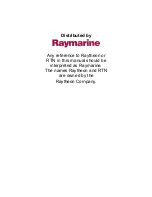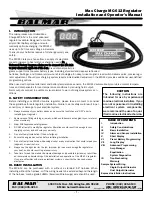
2
BEFORE EACH USE:
Inspect all your personal fall protection
equipment before each use. OSHA 1910.66
and 1926.502 and ANSI Z359.14 Class B
(SLE) requires an inspection before each
use. The use of American National
Standards is completely voluntary, their
existance does not, in any respect, preclude
anyone.
ANSI
requires
a
formal
documented inspection of fall protection
equipment be completed by a competent
person other than the user, at a minimun
once a year. More frequent inspections by a
competent person may be required based
on the severity of the workplace conditions.
ULTRA-SAFE equipment is designed for use
with
only
ULTRA-SAFE
approved
components
and
sub
systems.
Substitutions or replacements made with
non-approved components or subsystems
may jeopardize compatibility of equipment
and may affect the safety and reliability of a
complete system. Personal fall arrest
systems must meet applicable local, state,
and
federal
OSHA
requirements.
Connectors (hooks. Carabiners. and D-
Rings) must be capable of supporting at
least 5000 Ibs. Do not use equipment that is
not compatible with the anchorage or other
system components. Connectors must be
compatible in size, shape, and strength. Self
locking snap hooks and carabiners are
required by ANSI Z359.14 Class B (SLE) and
OSHA.
NOTE:
Large throat opening snap hooks
should not be connected to standard size D-
Rings or similar objects which will result in
a load on the gate if the hook or D-Ring
rotates or twist. Large throat snap hooks are
designed for use on fixed structural
elements such as cross members or rebar
that are not shaped in a way that can
capture the gate of the hook.
FALL:
After a fall, equipment which has been
subjected to fall arrest forces MUST be
removed from service for inspection.
Inspect the entire safety retractable lanyard
such as the load / impact indicator. On web
style find the fold on the web to see if the
stitching is broken and the fold torn apart or
for wire style check the swivel snap hook to
see if the RED indicator was engaged. The
safety retractable lanyard must be removed
from service and returned to an authorized
service station for repair, do not re-stitch or
repair.
INSPECTION:
1.)
Ensure the safety retractable locks
when the lifeline is pulled sharply,
with no slippage. Lock-up should
be positive.
2.)
Labels must be present and fully
legible.
3.)
Check the connecting hooks or
carabiners for damage, distortion,
or corrosion, and working condition.
4.)
Check the housing for distortion, cracks,
or other damage and make sure
anchorage point is not distorted or
damaged.
5.)
Inspect each component of the
personal fall protection system
according to the manufacturers
instructions.
6.)
The lifeline must fully extend and
retract smoothly with no hesitation
or slack on the line.
7.)
Check the lifeline for cuts, burns,
chemical damage, abrasions, loose
strands, or corrosion, the lifeline must
not be damaged.
8.)
Check for loose or missing screws and
bent or damaged parts.
9.)
Use of this equipment in areas where
surrounding hazards exist may require
additional precautions to reduce the
possibility of injury to the user or
damage to the equipment. Hazards
may include, but are not limited to:
high heat, caustic chemicals, corrosive
environments, high voltage power
lines, explosive or toxic gases, moving
machinery, or overhead materials that
may fall and contact the user or fall
arrest system.
10.)
CAUTION -
This unit has an internal
shock absorbing system. Do not
attach external shock absorber to
either end of retractable which may
cause brake pull to disengage
increasing freefall.
11.) Do not use standard web retractables
in temperatures over 180 degrees.
ULTRA-SAFE
®
Safety Retractable Device Inspection Criteria:
The authorized person using this equipment shall, at a minimum comply with manufactures instructions
regarding the inspection, maintenance, and removal from service of the equipment. Equipment shall be inspected by the authorized person
before each use
. Additionally,
inspections shall be conducted by a competent person other than the user. Inspection criteria for the equipment shall be set by the safety program administrator.
Documentation of equipment inspection shall be maintained by the safety program administrator. Inspections shall be conducted in intervals based on the type of use,
infrequent, moderate, and severe. If inspections reveal defects, damage, stress, activated warning systems, inadequate maintenance. The equipment shall be permanently
removed from service or undergo corrective maintenance through the manufactures authorized service department.
Type of Use:
Application Example:
Conditions of Use:
Inspection Frequency:
Infrequent to Light
Rescue and confined space,
factory maintenance
Good storage conditions, indoor or infrequent outdoor
use, room temperature, clean environments
Annually
Moderate to Heavy
Transportation, residential
construction, utilities, warehouse
Fair storage conditions, indoor and extended outdoor
use, all temperatures, clean or dusty environments
Semi-annually to annually
Severe to Continuous
Commercial construction,
oil and gas mining
Harsh storage conditions, prolonged or continuous
outdoor use, all temperatures, dirty environment
Quarterly to semi-annually
Inspection Requirements (normative)






























